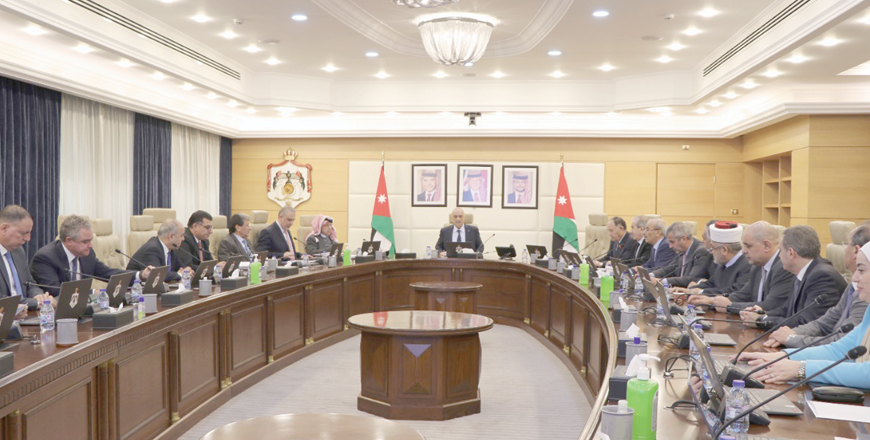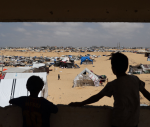You are here
Cabinet approves JD2.3 billion executive plan for Economic Modernisation Vision
By JT - Dec 27,2022 - Last updated at Dec 27,2022

Prime Minister Bisher Khasawneh chairs a Cabinet session on Tuesday (Petra photo)
AMMAN — The Cabinet on Tuesday approved the executive plan for the Economic Modernisation Vision (2023-2025), featuring 183 initiatives that will be implemented at a total cost of JD2.3 billion until the end of 2025, the Jordan News Agency, Petra, reported.
Prime Minister Bisher Khasawneh, chairing a Cabinet session, said that approving the plan represents the government’s commitment to implement the Economic Modernisation Vision as a main pillar of the comprehensive modernisation project that is led by His Majesty King Abdullah.
The prime minister directed all the concerned ministries and institutions to begin implementing the executive plan within the timelines set forth therein, noting that it includes clear indicators for measuring performance and a digital system to follow up on progress.
Stressing the importance of the Economic Modernisation Vision as a major national project, which constitutes a roadmap for the national economy over the next 10 years, he described the executive plan as “a flexible document complementing the plan to modernise the public sector”.
The executive plan was prepared collectively by four ministerial committees and 22 teams, and in consultation with the private sector, he highlighted.
A set of criteria was adopted to determine executive plan’s readiness, financing, alignment with economic reforms and sustainable development goals, and contribution to providing added value for growth and employment, he noted.
The plan comes as a practical translation of the Economic Modernisation Vision, including its priority initiatives, projects, policies, and procedures, he said, adding that it features 183 initiatives, which were selected from among approximately 380 initiatives that will be implemented with a total cost of JD2.3 billion until the end of 2025, of which JD670 million will be allocated for 2023.
The plan aims to review, amend and approve 46 legislative items and action plans to improve Jordan’s ranking according to international indicators and reports, and enhance women’s economic empowerment.
Setting macroeconomic targets for 2025, the plan seeks to raise the growth rate of Jordan’s GDP at constant prices to 3 per cent, gradually increasing the volume of exports to approximately JD9,713 million and net direct foreign investment to approximately JD1,092 million, he said.
In the field of women empowerment, the plan sets a number of initiatives, most prominent of which are implementing the women’s empowerment strategy, reviewing the legislative environment for women’s economic empowerment, preparing and implementing an action plan to improve Jordan’s rank in the Global Gender Gap Report, continuing the implementation of the action plan related to improving Jordan’s rank in the report on Women, Business and the Law and developing a national index to monitor and track women’s economic participation, he said, adding that 72 per cent of the plan’s initiatives directly impact women empowerment.
As for investment, the plan seeks to stimulate local and international investments through creating an attractive environment for investment.
In this regard, the executive plan included 14 initiatives and 20 priorities to be implemented with a total cost of JD171 million, of which JD56 million will be spent in 2023, he said, adding that an electronic platform for investors (Invest Jo) will be launched to provide advisory services related to investment opportunities.
The plan aims to render Jordan a regional hub for manufacturing high-value products through 64 initiatives and 116 priorities, to be financed with a total cost of JD315 million, of which JD91 million will be allocated for 2023.
In regard to Jordan’s agriculture and food security, the plan sets out to establish a comprehensive national database for food security, provide support for developing and exploiting agricultural land, and stimulate the agricultural sector and food processing.
As for the mining sector, it stipulates preparing and implementing a national strategy for mining, and reviewing the Natural Resources Law.
Focusing on logistics and transportation, the plan aims to create a national strategy for the transport sector for the years (2023-2027), prepare studies for the Toll Roads project, modernise border centres, rehabilitate the infrastructure of Amman Civil Airport for licensing purposes, and enhance customs systems.
Additionally, the plan included 31 initiatives and 75 priorities, with a total cost of JD232 million, of which JD52 million will be allocated for 2023 to support creative industries and initiatives, film industry, and electronic games industry, as well as institutionalise their work.
As for trade, the government will create a pricing database, support e-commerce, and amend and approve the e-commerce law.
To support healthcare in Jordan, the plan calls for establishing a health policy council, preparing a national strategy for the health sector, developing Jordan’s health roadmap, establishing a health simulation centre, and automating the drug inventory management system.
Aiming to ameliorate the financial situation in the Kingdom, the plan included creating a financial inclusion strategy and action plan for 2023-2027, reducing financing costs for medium and microfinance companies through loans granted by the Arab Fund for Economic and Social Development, and amending the legislation governing banking and Amman Stock Exchange.
Within the framework of Destination Jordan, which aims to consolidate the Kingdom’s position as a major destination for tourism and film production, the executive plan included seven initiatives and 17 priorities, with a total cost of JD254 million, of which JD80 million will be used for this purpose during 2023.
In this regard, the plan stipulates continuing to support aviation and low-cost flights, developing products and services to bolster Jordan’s tourism, restoring and rehabilitating archaeological and heritage sites and their facilities and buildings.
To keep up with the requirements and jobs of the future, the executive plan included 44 initiatives and 81 priorities at a total cost of JD486 million, of which JD138 million will be budgeted for 2023.
Initiatives in this regard include improving student performance in international exams, training and capacity-building for teachers before and during service, increasing kindergartens (KG2), implementing a comprehensive programme to compensate for learning loss, expanding vocational education in schools, developing and updating curricula for all basic and secondary levels, as well as preparing and implementing a comprehensive strategy for blended learning for all groups age.
As for the vocational education and training sector, the government, according to the plan, will develop vocational and technical education curricula and update existing ones in cooperation with sector skills councils, create vocational specialisations related to future professions, and introduce digital skills curricula for public school students from the seventh to the 12th grade in vocational education.
To improve the use and sustainability of natural resources in Jordan, the plan features 13 initiatives and 54 priorities, with a total cost of JD688 million, of which JD202 million will be allocated for 2023.
In this regard, the plan stipulated creating a financial sustainability plan for the electricity sector, launching a roadmap for the use and production of hydrogen, including related legislation, installing solar cell systems for municipalities, reviewing the pricing mechanism for petroleum derivatives, supplying industrial cities with natural gas, identifying renewable energy storage options, and implementing regional electrical interconnection projects.
As for the water sector, the plan included implementing the financial sustainability plan for the water sector, the water loss reduction project and the National Water Carrier Project.
To promote sustainable practices for the transition towards a green economy, the executive plan designated eight initiatives and 24 priorities, with a total cost of JD88 million, including JD33 million to be spent in 2023, the most prominent of which are recycling waste, developing qualitative agricultural projects adjacent to wastewater treatment plants, increasing the number of waste management facilities, expanding the Al Ekaider landfill site and Al Shaer station for solid waste, as well as launching the intensive green employment programme.
As for improving Jordanians’ quality of life, the plan included 10 initiatives and 31 priorities, funded with a total cost of JD66 million, of which an amount of JD18 million will be allocated for 2023, the most prominent of which are establishing the Bus Rapid Transit (Irbid — Zarqa, Jerash — Amman) and implementation of BRT2 (Amman), implement the comprehensive plan for the new city, enhance the infrastructure of central markets in Irbid and Amman, and develop an integrated plan for a smart transportation system in Jordan.
The executive plan document for the Economic Modernisation Vision (2023-2025) will be published in its final form on the Vision’s website (www.jordanvision.jo) in early 2023.
Related Articles
AMMAN — Minister of Industry, Trade and Supply and Minister of Labour Yousef Shamali on Saturday met with a number of industrialists in Irbi
AMMAN — The Economic Modernisation Vision's executive programme has announced nine initiatives for the 2023-2025 period at a total cost of J
AMMAN — Under the Economic Modernisation Vision’s (EMV) executive programme, the government will begin implementing mega-projects and initia
















